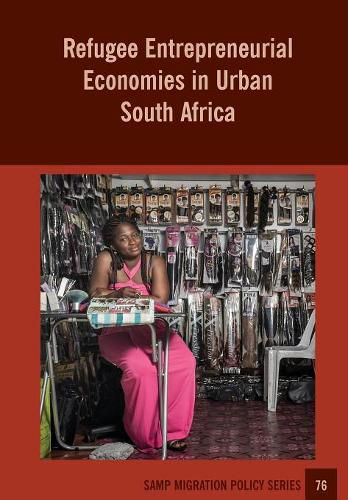Readings Newsletter
Become a Readings Member to make your shopping experience even easier.
Sign in or sign up for free!
You’re not far away from qualifying for FREE standard shipping within Australia
You’ve qualified for FREE standard shipping within Australia
The cart is loading…






This title is printed to order. This book may have been self-published. If so, we cannot guarantee the quality of the content. In the main most books will have gone through the editing process however some may not. We therefore suggest that you be aware of this before ordering this book. If in doubt check either the author or publisher’s details as we are unable to accept any returns unless they are faulty. Please contact us if you have any questions.
One of the defining characteristics of many large cities in the rapidly urbanizing global South is the high degree of informality of shelter, services and economic livelihoods. It is these dynamic, shifting and dangerous informal urban spaces that refugees often arrive in with few resources other than a will to survive, a few social contacts and a drive to support themselves in the absence of financial support from the host government and international agencies. This report addresses the question of variability in economic opportunity and entrepreneurial activity between urban environments within the same destination country - South Africa - by comparing refugee entrepreneurship in Cape Town, South Africa’s second largest city, and several small towns in the province of Limpopo. The research shows that refugee entrepreneurial activity in Limpopo is a more recent phenomenon and largely a function of refugees moving from large cities such as Johannesburg where their businesses and lives are in greater danger. The refugee populations in both areas are equally diverse and tend to be engaged in the same wide range of activities. This report shows that different urban geographies do shape the local nature of refugee entrepreneurial economies, but there are also remarkable similarities in the manner in which unconnected refugee entrepreneurs establish and grow their businesses in large cities and small provincial towns.
$9.00 standard shipping within Australia
FREE standard shipping within Australia for orders over $100.00
Express & International shipping calculated at checkout
This title is printed to order. This book may have been self-published. If so, we cannot guarantee the quality of the content. In the main most books will have gone through the editing process however some may not. We therefore suggest that you be aware of this before ordering this book. If in doubt check either the author or publisher’s details as we are unable to accept any returns unless they are faulty. Please contact us if you have any questions.
One of the defining characteristics of many large cities in the rapidly urbanizing global South is the high degree of informality of shelter, services and economic livelihoods. It is these dynamic, shifting and dangerous informal urban spaces that refugees often arrive in with few resources other than a will to survive, a few social contacts and a drive to support themselves in the absence of financial support from the host government and international agencies. This report addresses the question of variability in economic opportunity and entrepreneurial activity between urban environments within the same destination country - South Africa - by comparing refugee entrepreneurship in Cape Town, South Africa’s second largest city, and several small towns in the province of Limpopo. The research shows that refugee entrepreneurial activity in Limpopo is a more recent phenomenon and largely a function of refugees moving from large cities such as Johannesburg where their businesses and lives are in greater danger. The refugee populations in both areas are equally diverse and tend to be engaged in the same wide range of activities. This report shows that different urban geographies do shape the local nature of refugee entrepreneurial economies, but there are also remarkable similarities in the manner in which unconnected refugee entrepreneurs establish and grow their businesses in large cities and small provincial towns.